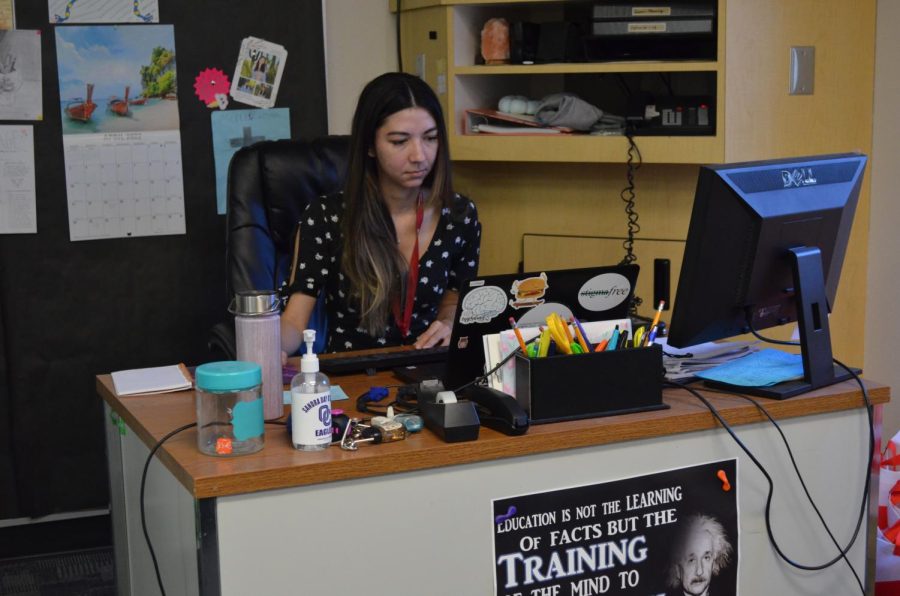Ms. Liptow psyches out the system
Photo by Ananya Thekkemelepatt
Ms. Liptow, psychology teacher, diligently prepares for class at her desk.
May 20, 2022
In recent years, majoring in psychology and the mental health field has become increasingly popular amongst students. Luckily, OHS has Kristen Liptow, psychology teacher, educating and inspiring students. Having majored in psychology and biology at Arizona State University, she enjoys looking for a biological explanation for behaviors she observes in people.
From studying psychology in university, to doing research, to becoming a case manager, leading her to becoming a teacher, Ms. Liptow has had valuable experience in the psychology field, allowing her to help OHS students as much as possible.
“I always had an interest in observing behavior and that kind of fit nicely with my interest in the physical world as well as the biological,” Liptow said. “I wanted to know what happens neurally when people are doing or behaving certain ways…It incorporates the empirical aspects but it’s also very philosophical.”
Though she went to ASU, Liptow also conducted ethical research on animals at the University of Arizona to learn about the impact of physical trauma to the brain.
“[My research] was focused on traumatic brain injury recovery…more specified for rodent studies,” Liptow said. “We analyzed neurally what ended up happening over the progression of time.”
Her interest in the field was sparked due to how impactful it could be in one’s life. Soon after college and her research, Liptow became a case manager, working directly with patients.
“I immediately went into case management…specifically for the severely mentally ill,” Liptow said. “Mental illness is a wide spectrum. It looks very different in everybody, even the same disorder.”
As a case manager, Liptow worked with a variety of people in many different situations, some even being drastic and nerve-wracking.
“With that in mind you just had to be a little more cautious, it definitely did make [me]nervous in some instances,” Liptow said. “But it was also exciting to get to help people in that kind of manner.”
Case managers interact with people that come from different backgrounds, requiring them to leave all biases out the door before ever assisting the patients. When working with people who are mentally ill, it is important to approach their case with an open mind to create an environment for them to get better and not feel judged.
“Overall, you just have to remember that everyone is at a different point in their life and circumstances play a huge role in behavior so we would never actually know what was happening internally with that person to make them react in whatever way they ended up doing that,” Liptow said. “So just knowing that you may never know what that person is going through gives you a little bit more sympathy or understanding.”
But due to many issues within the system, Liptow decided to leave case management. She decided to not sacrifice her values.
“Overall, it is when the morality of the company is not upheld,” Liptow said. “Uphold your own beliefs. If you have a moral code, don’t follow somebody and conform to what the job wants just because it’s a paycheck, there’s always other options out there and there’s lots of places that are going to maintain their moral code. So go with your gut.”
Along with being asked to do things that she did not agree with, the system is also very restricting with how much professionals can help vulnerable patients. This limited environment can prevent case managers from truly helping and does not benefit the patient either.
“You can only do so much and there’s a lot of limitations and limited access and limited resources out there in general so that in itself is a whole feat to battle,” Liptow said.
As an educator, Liptow strives to educate and spread awareness to the future of the industry, the current high school students, so that the systems in place can be fixed to benefit future patients.
“To change the system…you need to take care of yourself, that’s going to be the most important because when you’re taking care of yourself then you can start helping others,” Liptow said.
For anyone potentially going into the field of psychology, she advises to be confident in your identity before assisting others.
“Know who you are and feel comfortable and stable in who you are before getting into the field because it can be emotionally exhausting, so you need to have that foundation before you can really truly help others and in an impactful way,” Liptow said. “Establish boundaries whether it’s with your clients or students, upholding those are definitely going to help both parties.”
Finally, she acknowledges that life can be difficult and stress-inducing and empathy and understanding is what she finds most beneficial to get through it all.
“Don’t stress too much…Life is going to come regardless so just enjoy all the little moments,” Liptow said. “Being compassionate, that goes a long way.”





